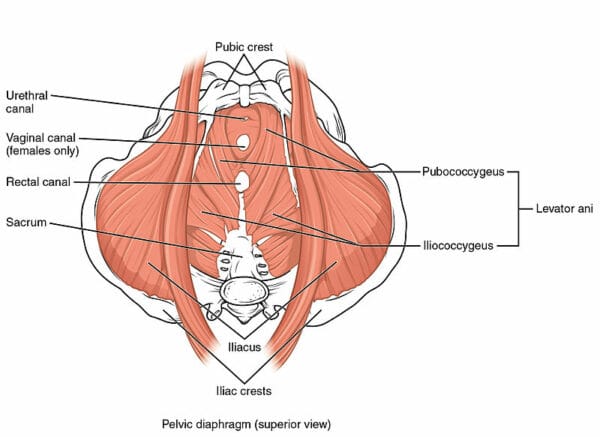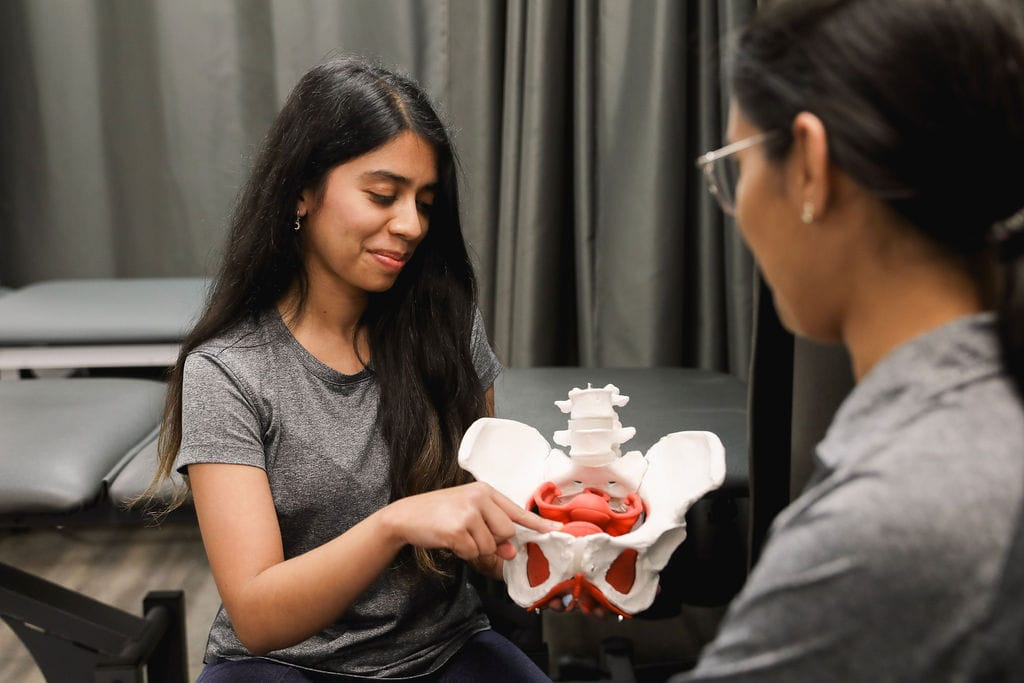Pelvic floor physiotherapy is a specialized form of physical therapy that focuses on the muscles, ligaments, and connective tissues of the pelvic floor. While both men and women have a pelvic floor, this form of therapy is particularly relevant for women due to specific concerns related to pregnancy, childbirth, and menopause.
Did you know:
- 1 in 5 women who have had a baby suffer from poor bladder and bowel control
- 1 in 2 experience pelvic organ prolapse
- 1 in 5 women suffer from pelvic or sexual pain
- Most physical activity will engage your Pelvic Floor Muscles
Also read, Physiotherapy Clinic in Etobicoke
Pelvic Floor Muscles

In order to better understand what happens in muscular dysfunction, it is important to first understand the normal function of these muscles, as well as other muscles that they work with. The Pelvic Floor Muscles are part of a group of muscles that are collectively referred to as your “core” muscles. This muscle group is composed of 4 distinct but linked group of muscles:
- Pelvic Floor Muscles
- Diaphragm
- Abdominal Muscles
- Lower Back Muscles
Also read, Physiotherapy Oakville
The Pelvic Floor muscle group is located at the base of the core. It is an important muscle group that works with the rest of the core to maintain pressure inside the torso when lifting heavy objects, coughing/sneezing or doing any other physical activity involving your lower back muscles. Some of the most important functions of the Pelvic Floor Muscles are:
- Maintaining control of the bowel and bladder in order to control leakage
- Holding up and supporting the bowel, bladder, and in the case of women, the uterus
- Playing an important role in sexual function
Pelvic Floor Muscles are located within the pelvic cavity and attach from the front to the pubic bone to the back to your tailbone or coccyx.
Also read, Physiotherapy treatment Mississauga
Pelvic Floor Dysfunctions in Women
For women, the Pelvic Floor holds additional importance as it is the group of muscles that handles enormous pressure during pregnancy. The ever-increasing weight of a child puts a strain on the pelvic muscles and the bladder, leading to frequent urination. As such, pelvic floor discomfort is quite common in women that are pregnant.
Advantages of Pelvic Physiotherapy for Women
Pelvic Floor Physiotherapy helps in the treatment and prevention of:
- Pelvic and bladder pain
- Painful intercourse
- Urinary leakage, frequency or urgency
- Post-pregnancy related problems
- Abdominal pain
What Do We Treat and How Do We Treat It?
At Triangle Physiotherapy, our Pelvic Health Physiotherapists can help treat:
- Vaginal Pain Syndrome (as a result of pelvic dysfunction)
- Pelvic Floor Dysfunction
- Pelvic Organ Prolapse
- Urinary Conditions
- And many more conditions!
Our assessments include:
- A thorough, 1-hour detailed history of your health issues, and specifically your pelvic issues
- A brief internal and external examination
Our treatments involve:
- Individualized treatment sessions that are 30 – 45 minutes in duration
- Generally, 4 – 8 treatments at a frequency of 1x/week* (varies from patient to patient) is recommended to best address your symptoms
If you’re a woman suffering from any of these conditions or are expecting a baby and would like to have healthy pelvic muscles, book an appointment today at any one of our 8 clinics in Etobicoke, Oakville, Mississauga (Square One), Mississauga (Erin Mills), North York, Toronto (King Street) Toronto (Queens Quay) and Toronto (Yonge Street).
Pelvic floor physiotherapy can significantly benefit women dealing with issues like incontinence, pelvic pain, and postpartum recovery. If you need specialized physiotherapy services, there are excellent clinics available in physiotherapy Etobicoke, Oakville, North York, Toronto, Lawrence Park, Queens Quay, Erin Mills, Mississauga, and Liberty Village. These locations offer expert care and tailored treatment plans to support women’s pelvic health and overall well-being.




